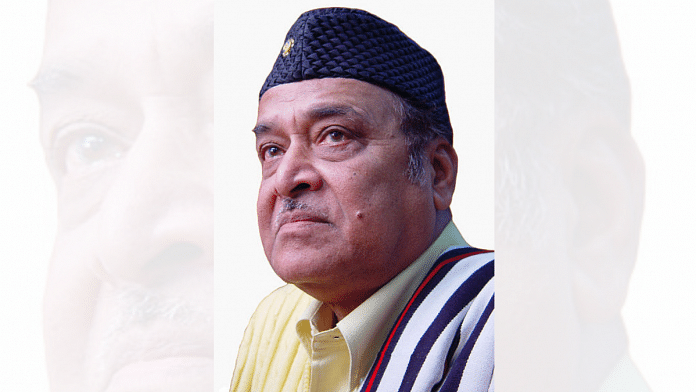A 2006 poll in Bangladesh found Bhupen Hazarika’s ‘Manush Manusher Jonno’ the second-most loved song in the country after its national anthem.
New Delhi: Bhupen Hazarika — also known as the ‘Bard of the Brahmaputra’ — was a multi-faceted talent, who commands huge respect not only from music lovers in his native Assam, but also across the globe.
A recipient of the country’s highest film honour, the Dadasaheb Phalke Award in 1992, Hazarika’s songs offered a new idiom to the Assamese music, helping it find greater acceptability at the national and international level.
Such is the popularity of his songs that a 2006 poll in Bangladesh found his ‘Manush Manusher Jonno’ (the Bengali version of his ‘Manuhe Manuhor Babe’) the second-most loved song in the country after its national anthem.
On his seventh death anniversary — 5 November — ThePrint looks back at the life and work of this singer, composer, lyricist and filmmaker.
Also read: 12 Kishore Kumar songs that are absolute gems but forgotten even by die-hard fans
A prodigious talent
Born on 8 September 1926 in Assam’s Sadiya, Hazarika was the eldest among 10 siblings. When he was very young, his parents moved to Tezpur, Assam’s cultural capital. He completed his early studies there before moving to Guwahati for higher studies, and then Varanasi, graduating with a master’s in political science from BHU.
Hazarika was a prodigious talent. In one of her interviews, his sister Sudakshina Sarma, also an accomplished singer, recounts how Hazarika often used to come home picking up the folk tunes and songs of various communities and tribes. By his early teen years, he was delivering performances on the All India Radio, and in 1939, became a star after singing in an Assamese film Indramalati.
To US and back
In 1949, he went to the US for a PhD in mass communication at Columbia University. There he met and married Priyambada Patel, from whom, however, he later became estranged.
On the advice of his mentor and one of Assam’s biggest cultural icons, Jyoti Prasad Agarwala, he met the legendary American singer Paul Robeson, who came to wield significant influence on Hazarika which was reflected in many of his songs composed and sung later. For instance, his song, ‘Bistirno parore’ is based on the theme of Robeson’s, ‘Ol Man River’.
Returning to India in 1953, he started teaching at Gauhati University but soon left it. Thereafter began his association with the Left-leaning Indian People’s Theatre Association (IPTA). Along with his colleagues, he transformed IPTA into a mass movement that started providing a platform for social and political dialogue to everyone.
In the period that followed, Hazarika composed and sang some of his most famous songs such as Rongmon Macholoi gol and Dola Dola, highlighting the sufferings of the marginalised.
In 1956, he also started his filmmaking career by directing the movie Era Bator Sur, featuring legendary actor Balraj Sahni, revolutionary artiste Bishnu Prasad Rabha, among others. This was followed by other films such as Shakuntala and Pratidhwani.
Hazarika also flirted with mainstream politics on a few occasions. He fought and won an election for the Assam Assembly in 1967 as an Independent. In 2004, he also fought a Lok Sabha election on a BJP ticket but lost.
Also read: On Lata Mangeshkar’s birthday, 15 rare gems that belong on her crown
Relationship with Kalpana Lajmi
Perhaps no account of Hazarika’s life can be complete without a discussion of his relationship with film director Kalpana Lajmi, who passed away on 23 September this year. It was an unconventional relationship by all accounts.
Their first meeting, as Lajmi, recounts in her book Bhupen Hazarika: As I Knew Him, happened when she was in her final year of school. Hazarika had visited her home to meet her uncle. After the initial introductions were done, she recalls, “He had forgotten me by then but I was smitten.”
The next meeting happened when she was a 17-year-old college student and Hazarika was 45 years old. Recalling the incident, Lajmi writes that, “at seventeen, I had thrown caution to the wind…. knowing only that I was head over heels in love.”
Later, she was introduced to Hazarika by his friend and entrepreneur Hemendra Prasad Barooah for a movie she wanted to direct. Their friendship started from that period onwards, and she remained his companion until his death in 2011.
Some of his famous songs (from Lajmi’s book)
Moi eti jajabor (Forever a wanderer)
Moi eti jajabor dharar dihinge dipange lohoru, nibisaru nija ghar
Manuhe Manuhor Baabe (Man is for humanity)
Manuhe manuhor baabe, jodihe okonu nebhaave
Okoni xohanubhutire
bhabhibo kunenu kuwa, Xomoniya?
Hazarika, who was posthumously awarded the Padma Vibhushan, also received the National Film Award for Best Music Direction in 1975, the Sangeet Natak Akademi Award (1987), Best Music for the film Rudaali at the Asia Pacific International Film Festival in Japan (1993), ‘Muktijoddha Padak’ by the Bangladesh government (posthumously, 2011), among others.



